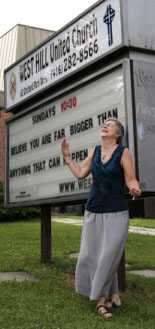I’m all for the metaphorical application of such an idea, but it seems that the ACoC has been invaded by a tribe of literalists, so the fire in question is the result of rubbing a few pieces of wood together. Why not use a match, you may wonder: that would be cheating and cheating would hardly be sacred would it?
From here:
Gathered outside in the early morning hours, a circle of onlookers watched as volunteers rubbed spindles into fireboards, trying to produce enough friction to create an ember.
For young men in the Diné tradition, building a fire from scratch remains a rite of passage. The hard work of sparking a blaze without the aid of matches, lighters, etc. teaches virtues such as patience, forbearance, and perseverance.
The fire will be kept running all week, even during the obligatory fulmination against global warming by Bishop Mark MacDonald. The CO2 emitted must be sacred CO2.
Ironically, a persistent fear is that the Arctic might be getting warmer; isn’t there anyone in the Arctic who would like it to get warmer? As this study points out, cold weather is 20 times as deadly as hot weather.
For the evening presentation, Bishop MacDonald discussed the issue of climate change from a biblical and Indigenous perspective.
Early on, he noted his preference for the term “climate injustice” as the people who stand to suffer the most from the effects of climate change—the poor, the dispossessed, people of the land—are those who had the least to do with creating the problem, as is the case with residents in the Arctic.
Primate Fred Hiltz lamented that the church has turned away
from its evangelical call to follow “other gods” such as imperialism, the institutionalizing of racism and policies of assimilation. And lighting sacred fires.
Inexplicably, he omitted that last sentence.


 From
From  From
From